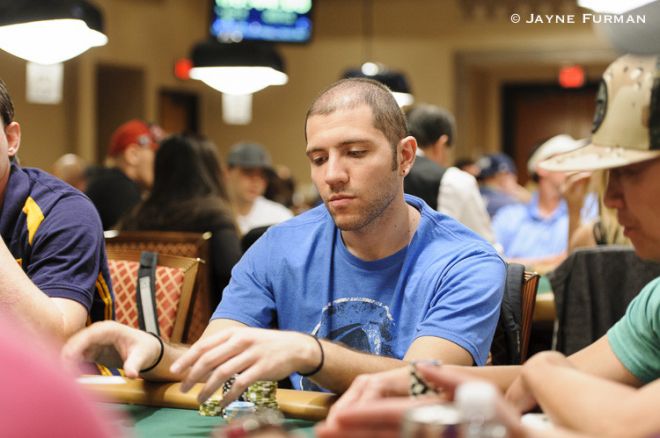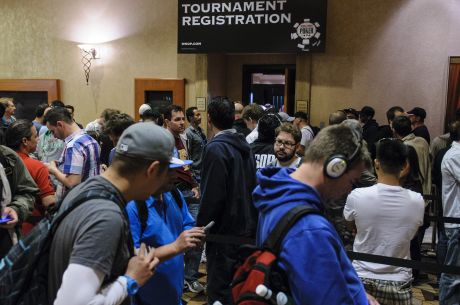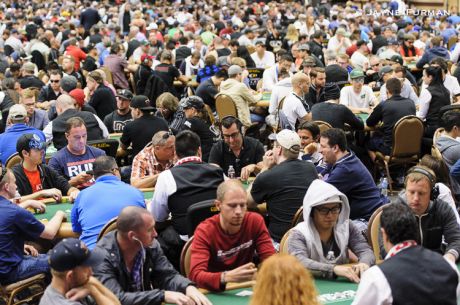Four-Bet Sizing: Thinking About Postflop Pot-to-Stack Ratios

Covering live poker tournaments for a living affords me the opportunity to see countless thousands of hands played out, many of which offer interesting and potentially valuable insights into how players �� both amateurs and professionals �� play the game. In this ongoing series, I��ll highlight hands I��ve seen at the tournaments I��ve covered and see if we can glean anything useful from them.
Today we��ll again take a little departure from the norm as I critique a hand I played in a recent tournament.
The Scene
I��m playing in Event #1: $565 Casino Employees No-Limit Hold��em at the 2015 World Series of Poker. The event drew 688 players total, a bit down from previous years. The structure has been sped up a bit with 40-minute levels now. While there��s still plenty of play, there��s also a bit more urgency to gather chips than when levels were 60 minutes in the past.
We pick up this hand late in Level 5 (100/200/25). I��m sitting with a stack of roughly 11,500, up from my starting stack of 5,000. My opponent in this hand has approximately 9,400. I have recently been moved to this table, and the only time we clashed was when I opened with jacks under the gun, called a three-bet from this opponent, and check-folded an ace-high flop. He seems to be on the tighter side, while I��ve been opening a fair amount of pots.
The Action
Action folded to me in the hijack, where I opened for 450 with A?K?. My opponent on the button made it 1,200 to go. The blinds got out of the way, and I was ready with a four-bet to 2,950. My opponent flat-called, and we took in a flop of 6?4?2?.
My opponent had roughly one pot-sized bet left, so I shoved all in with my overcards and a backdoor flush draw. He called after thinking briefly with J?J?. I got a friendly turn as the Q? arrived, but no help on the river.
Concept and Analysis
Everything in this hand starts off fairly standard as I make my normal-sized open and get reraised. Having already played a three-bet pot with this player and having a fairly active image myself, I wasn��t surprised to see him come after my open with the three-bet, and I quickly four-bet the ace-king for value to about 2.5 times his raise. I expected this four-bet to put him to an all-in-or-fold decision.
What I didn��t count on was my opponent flatting the four-bet. His decision put me in a very awkward spot as he had a pot-sized bet left and I bricked the flop.
Many players, especially in small-stakes tournaments like this one, will splash around in three-bet and four-bet pots with hands much worse than ace-king. I had a few reasons for shoving at the time.
First, I didn��t want to bet small and give these hands a chance to bluff me. Second, I hoped to put him to a difficult decision for his stack with medium pairs. Third, if he did decide to roll with a medium pair, I wanted to be able to realize my equity against these hands by seeing all five cards.
In retrospect, this is a situation I should have avoided entirely. When faced with a three-bet from this player at the stack sizes given, I had a few options available.
Folding ace-king in this spot is out of the question. I could simply call the raise and play postflop with a good hand, though I would obviously be at a positional disadvantage. Or I could jam or three-bet large enough �� something like 3,800 �� that getting the rest of the money in postflop would become a trivial decision.
The option of three-betting small, which I chose, looks to be the worst of them all, given the pot-to-stack ratio. It��s important to consider stack depth when sizing your four-bets. You have to think about what the pot-to-stack ratio will be postflop, and figure out how playable your hand will be at that point.
Because I failed to do this, I was stuck in a spot with no good options and ended up losing a majority of my stack. When the blinds went up to 150/300/25 shortly after that, I was left with just seven big blinds and busted in short order.
Want to stay atop all the latest in the poker world? If so, make sure to get PokerNews updates on your social media outlets. Follow us on Twitter and find us on both Facebook and Google+!








